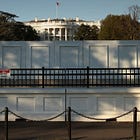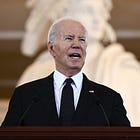Empire of Dirt
The depravity — and humiliation — of endorsing Andrew Cuomo
Bill Clinton left office with a net-approval rating of plus-37 percent. Two thirds of Americans believed he had had a successful presidency; fewer than 30 percent disagreed. After all the scandals, even as he handed over power to an ideological rival instead of his vice president, and despite providing numerous reasons to see him less favorably both as a politician and as a man, it is inarguable that he ended his second term with the popular reputation of a respected statesman.
I wonder if he knew on Inauguration Day 2001, as he solemnly reflected on his legacy and surveyed the Oval Office for the last time, that two decades later he would wind up endorsing a losing candidate in a municipal primary.
The Democratic Party is at a moment of reckoning. The supposed silver lining for the party after the humiliating defeat of the 2024 election was the benefit of contrast — that as the backlash inevitably grew against Donald Trump’s agenda, the Democrats would look better by comparison. So far this has proven half right. Public opinion is already against Trump on every single tracked issue, and the only precedent for a President to be viewed so unfavorably this early into their term was Trump himself eight years ago. Yet the Democrats are now even less popular than Trump, thanks largely to their own base’s frustration with the party’s strategy of feckless opposition. About as many Americans believe the moon landing was faked as strongly approve of Congressional Democrats.
Andrew Cuomo, whom grassroots upstart Zohran Mamdani just defeated in the primary for the New York mayoral election, is a caricature of why voters are disillusioned with the Democratic establishment.
The son of Democratic bigwig Mario Cuomo, Andrew has spent virtually his whole adult life in politics. In his most recent position of governor, he used his power as the head of the New York Democratic machine to cede control of the state legislature to Republicans. He won the hearts of liberals around the country and an Emmy for his video briefings early in the COVID-19 pandemic, then proved himself to be one of the country’s biggest public-health hypocrites by falsifying mortality data and slowing vaccine distribution in service of a political feud. Cuomo’s brother, a prominent newscaster, was caught secretly helping him navigate the media coverage of his numerous scandals. He is so far removed from day-to-day life in the city he’s been seeking to represent that he forgot that it is illegal to turn right on red.
Of course there is the matter of why Cuomo is a former governor. He resigned in disgrace in 2021 while facing at least 11 separate allegations of sexual harassment. In a party that ostensibly cares about inappropriate conduct towards women, most assumed that this was the end of his career — until a few months ago, when he entered the race to be New York’s next mayor, and immediately emerged as the frontrunner to unseat incumbent Eric Adams.
As the campaign wore on and his name-recognition advantage wore off, a desperate Cuomo (who is not Jewish) tried to reframe the race as a superficial referendum on antisemitism. It’s a familiar move for Cuomo: he attempted to launder the start of his grotesque rehabilitation tour through performative allyship two years ago by launching an advocacy organization that never actually did anything. Still, it’s remarkable that a goy who not even five years ago was accused of singling out the Orthodox community with COVID-19 restrictions (justified by citing a decade-old event as a contemporary infraction) and once grumbled “these people and their fucking tree houses” about Sukkot celebrants saw supportiveness of Jewish constituents as a favorable issue for him. How many elderly Jews were among the COVID-19 victims Cuomo hid from the public? Even if you accept that Mamdani would be bad for Jewish New Yorkers — as a Jewish American, so far as I can tell, this is a smear mostly rooted in Islamophobia and the antisemitic conflation of Judaism with Zionism — surely Jewish candidate Brad Lander would have been a better choice than the guy who derisively refers to us as “these people.”
All of which is to say that, if a member of the moderate Democratic establishment were serious about seeking common ground with the younger and further-left coalition members whom the party has been neglecting for the past several years, this primary offered a very convenient opportunity to do it.
Endorsing the progressive Mamdani, or the ideologically similar Lander, or simply the broader coalition against Cuomo would have been incredibly easy: I don’t always agree with Mamdani, but we can’t let someone like Cuomo back into power, or supporting a cartoonishly corrupt sex pest is not a good look for the centrist movement. It’s a municipal office in a city that’s seen as a liberal bubble no matter who’s in charge, and the moderate wing’s standard-bearer was persona non grata mere months earlier. With the stakes so low, wouldn’t it have been smart to throw the left flank a bone?
And yet! Several dozen Democratic leaders endorsed Cuomo rather than cede an inch to younger progressives — even though nearly half of them had previously called for his resignation. Fellow former governor David Paterson called Cuomo a “bully” then yet voiced his support now. Congressman Ritchie Torres, an aspiring gubernatorial candidate and a self-appointed gentile arbiter of Jewish identity, stressed Cuomo’s “competence” in 2025 after describing his “collapse of confidence” in 2021. While current Governor Kathy Hochul — who took over when Cuomo resigned — stopped short of endorsing him, she was careful to distinguish between the criticisms she offered at the time and her assessment of him now. Ditto for Kirsten Gillibrand, who courageously stoked the public pressure that led to Al Franken’s resignation from the Senate over similar allegations, yet now saves her fury for her new intra-party enemies: colleagues who are insufficiently obsequious to the Trump administration.
The establishment faction of the party constantly preaches to the rest of the coalition about the importance of pragmatism and compromise. They just showed just how disinterested they are in taking their own advice. In the wake of Mamdani’s victory, that choice now looks not just craven but idiotic.
New Yorkers weren’t the only ones feeling the Cuomo-mentum. It is not my place to parse the influence of longtime congressman James Clyburn, one of the most-esteemed Black leaders in the party, nor the significance of his endorsement. But I wonder, if you pressed him, how he would explain feeling compelled to vouch for someone as odious as Cuomo in on a civic election hundreds of miles away from his district. (This isn’t the first time he’s chipped in to help a corrupt centrist stave off a progressive challenger.) And if we are getting into the identity politics of endorsements, it ought to have been relevant to Cuomo’s claim as the anti-antisemitic candidate that both Mamdani’s highest-billed endorser (Bernie Sanders) and his hardest-working supporter (Brad Lander, the third-place finisher who stumped with Mamdani and pushed his own voters to rank Mamdani over Cuomo) are Jewish.
Which brings us back to Cuomo’s premier backer: Bill Clinton. Obviously Clinton is ideologically aligned with Cuomo, who served in his cabinet. Nor is it surprising that Clinton, who has a long history of sexual-assault allegations, is unbothered by a serial harasser holding power. Yet his choice to actually endorse Cuomo strikes me as utterly bizarre. Isn’t it beneath a man who once held the nuclear codes to back a candidate everybody hates in a municipal primary campaign for a city he doesn’t live in? Why did he stake his political capital on a candidate so lazy that he let ChatGPT write his platform? What does it say about Clinton’s political impotence — and the power of the grassroots movement he tried to stop — that the rank and file of his own party were not moved by the former Leader of the Free World throwing his weight around in a local race?
I followed the campaign closely even from a couple states away — a reluctant indulgence to New Yorkers’ presumption to be the center of the universe — and was flabbergasted at how city insiders closed ranks behind Cuomo. I don’t expect the Democratic Party to be welcoming to a grassroots movement like Mamdani’s campaign. But I naïvely thought that, at a time when their base demands energy and their recent electoral results require humility, party leaders would not be so shameless as to throw in their lot with a man they’d recently pressured into resigning. Now we know just how many ostensibly liberal pols are more bothered by free bus fare and childcare than sexual harassment and playing petty politics with public health.
It’s a despicable reflection on all the public figures who backed Cuomo that they would rather compromise their morals and decency than their myopic view of what and whom the Democratic Party stands for. And in the wake of his — and their — defeat, it’s also a humiliating one.
It’s strange to feel optimistic about electoral politics. But the biggest city in the country is now on track to also have one of its coolest mayors. Maybe even more encouragingly, the Democratic rank and file rejected the top-down push to keep power in the hands of the old boys club — and it happened in New York, where the voters represent the base on whom so many of the party’s most-feckless leaders rely. The city that never sleeps just sent out a wakeup call. Start spreading the news…






Excellent, and your opening was 🤌